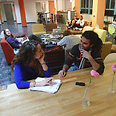
Abraham Hostel. 'We want to give guests a place to express themselves'
Photo: Yaron Burgin and Gal Mor
It’s breakfast time at the Abraham Hostel on Jerusalem's Haneviim Street. A mural on one wall of the kitchen tells guests, “Abraham always shared his food.”
Here, nobody seems to be in a rush. They linger, chatting in a variety of languages at long, communal tables. They eat, then refill their plates.
The buffet offers the ubiquitous Israeli cucumbers and tomatoes, as well as bread, cheese and cereal. There’s instant coffee and tea. It’s more modest than in most Israeli hotels, but nobody seems to care. In most places in the mornings, tourists eat quickly and head out for a full day of sightseeing.
Significant Step
Hostel industry leaders come together for WHC – first time outside of Europe, North America
“There are early bloomers and late bloomers when it comes to tourists,” Yaron Burgin, the general manager and one of the owners of the hostel, tells The Media Line. “These are the late bloomers. Some of them were drinking at the bar until 2 am, so they sleep late and then have breakfast.”
The guesthouse, which opened in 2010, was just rated No. 8 of all large hostels in the world by the Hostel Association. It offers 260 beds in 72 rooms, half in shared “dorm” rooms, and half in private rooms. The rooms are clean but very Spartan – narrow beds with sky-blue pillowcases. The dorms sleep 10 to a room, some segregated by sex and others mixed, and offer communal showers.
But the rooms are not what draws the clientele.
“There are a lot of people around, which is nice and it’s a lot friendlier than any hostel I’ve been to Israel so far,” Taryn Levy, 19, a student at Western University in Toronto, told The Media Line. “It’s also the cleanest one I’ve been in.”
The price is certainly right. A dorm bed costs about $30 per night, and a private room for two with its own bathroom runs about $100. Breakfast is included, and guests can use the kitchen facilities for their other meals.
The hostel attracts mixed ages, including several senior couples.
“It's quite a change from the Ramada, but it's fun to see the difference,” Martha Mason, 69, from Rock Hill, South Carolina, told The Media Line with a laugh. “It’s pretty noisy but we knew it would be fun.”
Mason and her husband had just completed a 12-day Christian tour and wanted to spend a few more days in Jerusalem. The receptionist in their retirement community had stayed here and recommended it.
“Price was a definite factor as well as location,” she said. “We wanted easy transportation because we don’t have a car here.”
Across the room, Alex Mills, also 19 and a student from Liverpool, agrees. He came with a friend to cheer on the British team in the under-21 soccer championships held in Israel for the first time. Unfortunately, he says, his team didn’t do very well.
“It’s quite clean here, the people are friendly and it’s air conditioned,” he tells The Media Line. “Plus there’s a cheap bar and it’s right in the center of the city.”
The bar, which serves “the cheapest beer in town” says co-owner Maoz Inon, is the focus of evening socializing. One of the beers served is Taybeh Beer, brewed in the West Bank.
Common father of Judaism and Islam
Travelers who want more of a taste of Palestinian culture than the beer can take one of the tours offered by the hostel. Most popular, says Burgin, is Hebron – city of Abraham, referring to Abraham’s burial site known to Jews as the Cave of the Patriarchs and to Muslims as the Ibrahimi Mosque. In 2004, an extremist Jew, Baruch Goldstein, opened fire on Muslim worshippers there, killing 29.
The Hebron tour, offered twice a week, costs $75 for the day. It includes a visit to a Jewish community built on land Israel acquired in 1967 which Burgin calls a “settlement” and meetings with Palestinians who live in the city.
“We are not a political organization in any way, but we think tourists should see reality for themselves,” the co-owner says. “They get their mind blown from this tour. It makes them think and realize how complicated the situation is here.”
There are also tours to Bethlehem and the much-less visited Palestinian town of Nablus in the northern West Bank. These areas are under full Palestinian control, and, according to Israeli law, Israelis are not allowed to enter them.
On the roof of the hostel, the owners have laid down green astro-turf and set out low couches, and a few sunbeds. One wall is covered with colorful drawings done by guests. There are Jewish and Muslim symbols as well as the words “Israel” and “Palestine.”
“We want to give the guests a place to express themselves,” Burgin says.
There are also more conventional tours to sites like Masada, the hilltop palace of King Herod, and the Galilee. There are daily free lectures and free spoken Hebrew and Arabic classes. There is even a chance to volunteer by playing with children of African refugees in Jerusalem while their mothers try to learn Hebrew.
All of the owners are serious backpackers, and know what independent travelers need. They are businessmen, and they are making money. But they also have a sense of mission.
“Our vision is to bring Abraham’s Biblical hospitality to the 21st century and to make the Middle East a great destination for all backpackers and travelers,” co-owner Inon told The Media Line. ”Abraham was famous for his hospitality and for sharing his tent and his food. He is also the common father of Judaism and Islam which is part of our message.”
Article written by Linda Gradstein
Reprinted with permission from The Media Line















